Mayapple — Dangerous & Delicious
•Posted on april 17 2017

Mayapple — Mandrake, Ground Lemon (Podophyllum peltatum)

Young shoot emerging from the ground with leaves tightly furled around the stalk — Photo by Dyson Forbes
About ten years ago, we planted five small Mayapple rhizomes on our property two hours north of Toronto. Now we have about 44 plants and counting. Every year we get closer to being able to pick some of the fruit, though contending with the local wildlife is a struggle. Most of the time the fruits vanish.

Newly unfurled Mayapple leaf — Photo by Dyson Forbes
In early spring, when not much is up yet, the newly unfurled Mayapple looks particularly lush with its bright vibrant green umbrella-like leaf. Nearby the leeks and trout lily are just getting started as well.

A modest stand on Mayapple early in the season
Mandrake (also known as the mayapple or ground lemon) is so named because of the golden fruit that appears under its massive tropical looking leaf in late May. The fruit ripens by late June or July.


Each plant has one hidden flower — Photo by Dyson Forbes

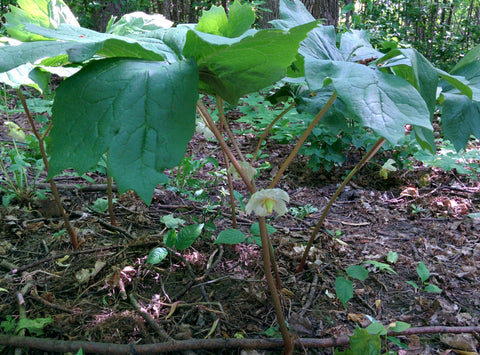
The flower gives way to the fruit — Photo by Dyson Forbes
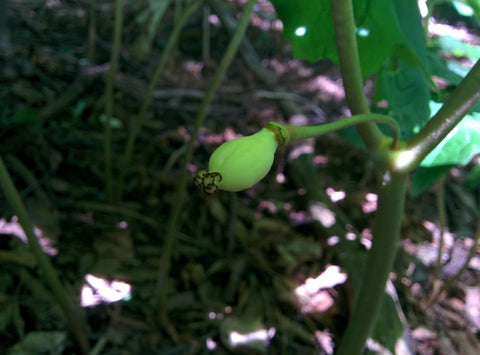
Young fruit emerging — Photo by Dyson Forbes
The entire plant, apart from the ripe yellow fruit, is deadly toxic. Even the seeds are toxic, and you can only eat a little bit of the ripe fruit as a serving. While it may have some medicinal uses and folklore associated with it, there have been many accounts of mayapple poisoning so it's wise to be careful with ingesting it.
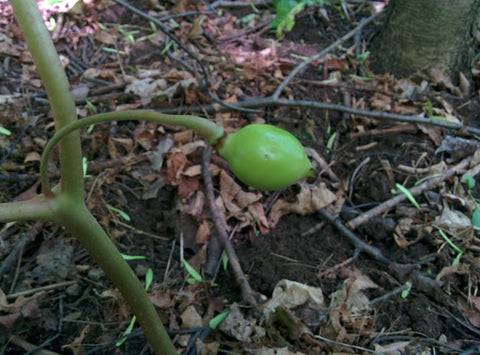
Young growing lemon shaped unripe fruit in late spring — Photo by Dyson Forbes
Still, it has a wonderful exotic flavour that seems out of place in the North. It is a fascinating native plant that is a wonderful midsummer treat. The pungent odor attracts lots of critters; consider it a victory if you get to the fruit before the raccoons do. The fruit will become soft and yellow as it ripens. It is possible to ripen a near-ripe fruit off the plant, but it should be starting to turn yellow already.
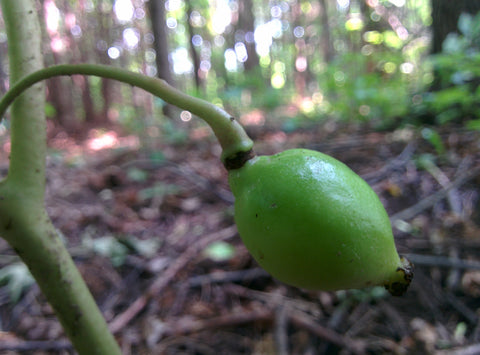
Photo by Dyson Forbes
Waiting for the fruit to ripen can take longer then one wishes, then boom, some animal has taken it. You can put a net over some of the plants to try to keep pests away.

Photo by Dyson Forbes
We are pleased as punch that the Mayapple has become so prolific where we reintroduced it. The woods have grown in over the ten years since they were planted and the area has become much shadier, so we are going to try to spread some more in a few places nearby in hopes of more fruit in a sunnier location. Mayapple often grows on the edges of woodlots in moist soil and partial sun where it gets lots to feed on.

Photo by Dyson Forbes
A ripe Mayapple will be soft to the touch. The skin can become slightly wrinkled and it will have a strong odour that rubs off on your fingers (and attracts raccoons).
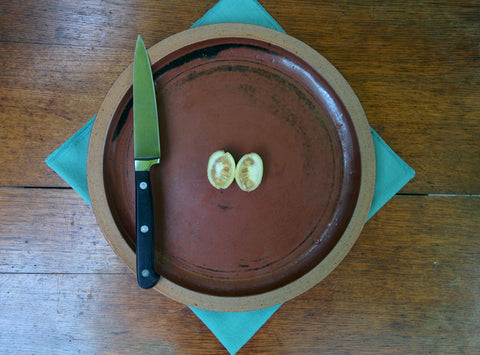
Photo by Dyson Forbes
Cut your Mayapple in half to scoop out the seeds. While some people will eat the seeds, we recommend removing them as they do contain some of the toxins found in the plant and do not add much if anything to the flavour.
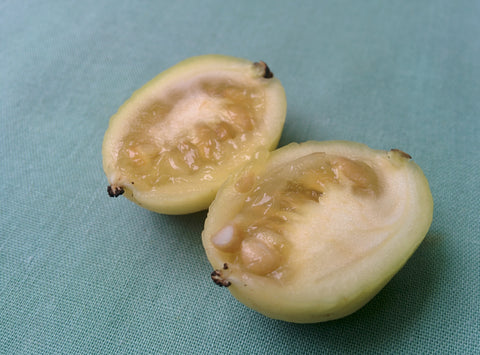
Photo by Dyson Forbes
The flavour of mayapple is unique, sweet and tart with a grape-pear flavour that has hints of citrus. Like Fugu or wild mushrooms, mayapple has that thrill factor when prepared: a delicious, dangerous food that delights. You can use Mayapple much like you would a fresh over ripe plum. When cooking or preparing dishes with Mayapple, use sparingly — the ripe fruit can still have a laxative effect on some people.
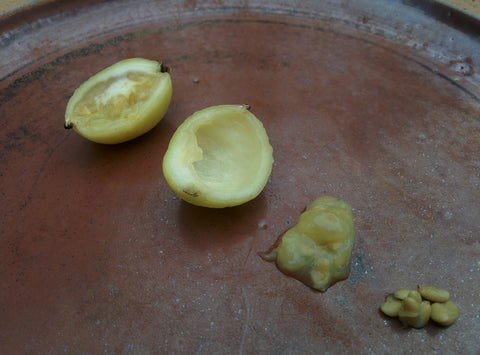
Photo by Dyson Forbes
More Posts
-
Get to know the mos...
Autumn is the absolute best time for mushrooms, after a year of growth the cool nights trigger mycelium to shoot out new fruiting bodies and the fo...
Read More
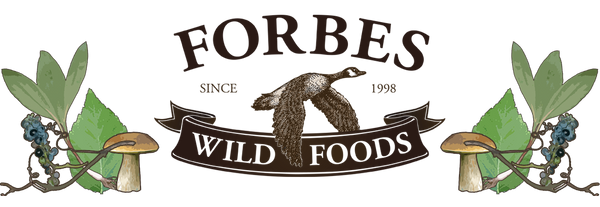



Comments
11 Comments
-

Posted by Laura | September 24, 2024
-

Posted by David P Hillesheim | September 24, 2024
-

Posted by Judy | September 24, 2024
-

Posted by Susan | September 24, 2024
-

Posted by Deborah Robertson | September 24, 2024
-

Posted by Deborah Robertson | September 24, 2024
-

Posted by ishika | October 26, 2022
-

Posted by Charlotte | August 04, 2022
-

Posted by Tulla Lightfoot | August 04, 2022
-

Posted by Connie | August 04, 2022
-

Posted by Wonda Fesmire | August 04, 2022
Leave a CommentI picked a mayapple plant
As I returned back indoors my ring finger pad bean to swell up pretty bad and had a lot of pressure in it like it would explode.
Can mayapple plant cause this swelling? Toxins?
Are used to eat them all the time when I was out hunting Partridge in September
We are in Michigan and only have the flowers no fruit yet but just found them by woods will be watching for fruit
What a good and thorough review! Thank you. I wish Picture This (Ap) would do as well. I am in Vermont and have a small patch that is under a Tamarac tree in my yard. They get morning shade and full sun all afternoon. And it gets hot! They like to creep towards the sun and have left the garden boundaries. No critter seems to like them. When they are done they go by fast. I think I will move some to the woods.
We have a farm outside of Como ,Tx about 1and1/2 hrs north east of Dallas. In a wooded area close to our creek, we discoved this plant, looked it up on our plant identification app an found your sight. We have never seen the flower nor the fruit since our wooded area contains lots of wildlife. There are probably 20 to 30 plants in the are off our trail that we can see.
We have a farm outside of Como ,Tx about 1and1/2 hrs north east of Dallas. In a wooded area close to our creek, we discoved this plant, looked it up on our plant identification app an found your sight. We have never seen the flower nor the fruit since our wooded area contains lots of wildlife. There are probably 20 to 30 plants in the are off our trail that we can see.
I like these topics very much. I would like to see such topics daily, this post is very good indeed. There are people like you in the world who put forth their views. Thank you so much for posting such a great post. https://anupatel.in
Thank you so much. We have these in abundance in our backyard in NC mountains near Grandfather
Wow! Thanks for all the information. Down here in North Carolina the Mayapple leaves are lush in April. By the middle of May, the plants are yellow speckled and withering. Today, May 11, I was only able to find one fruit. It was the color of a mango. I wonder if I have a different species of the plant.
Thank you! We have these growing all over and I was curious!
We live in West Tenn and May apples are all in our woods and some already have fruit but I would be scarred to eat